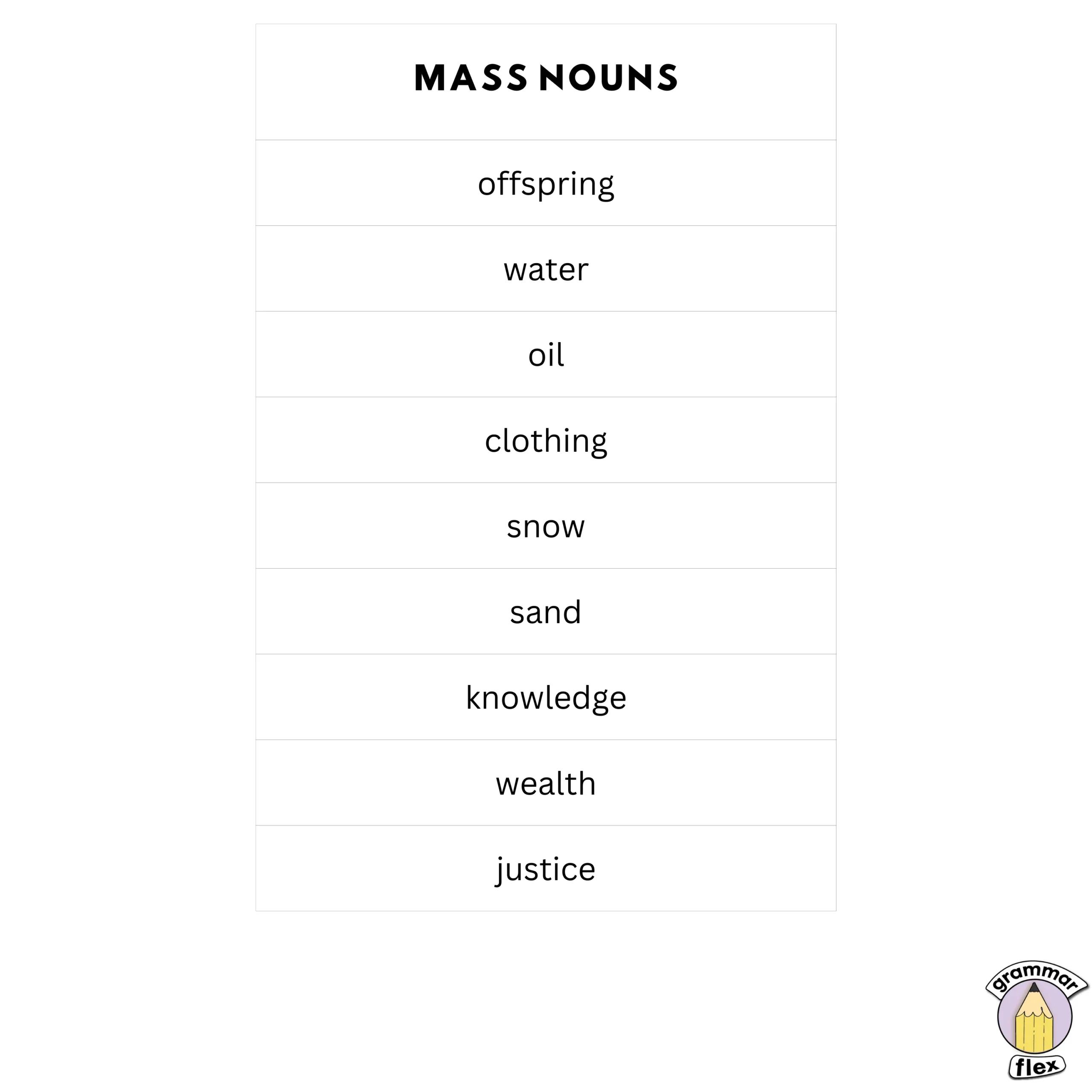What is a mass noun?
Have you ever tried to count the individual grains of rice in a bag? Bet you haven’t … or you’d probably still be counting them all. What about the grains of sand on a beach, or water, for that matter?
Knowledge is power.
We need some water.
We need a water.
Knowledges are power.
If the thought of counting rice makes your head want to implode (as it should), see how English at least tries to make sense in this case by assuming their plentifulness linguistically. Rice, sand, water, oil, knowledge and justice are what we call mass nouns in English, also known as uncountable nouns or non-count nouns.
Uncountable nouns and mass nouns are literally what they’re called: they are things in the world, and even ideas and concepts, that we cannot physically or literally count/quantify. Mass nouns only use singular noun forms, for the most part, and have no plural noun form (despite referring to things that are abundant and seem plural, at least intuitively).

What are plural and singular nouns?
Some things are easy for us to count: pens, books, tables and dogs are all things that we can count and assign a number to indicate the exact quantity/amount of that thing there are at any given point in time. English reflects count by having two kinds of nouns: singular and plural.
In most cases, regular plural noun forms use an -s or –es at the end to show plurality, or more than one. Importantly, not all plural nouns take on an –s or –es to convert to plural, see how goose plural is geese, or man plural is men. These are considered irregular plural nouns forms in English (since they don’t use the standard -s/-es to show plural). Anything that has a singular and plural noun form are things that we can count. This is what differentiates mass nouns, or non-count nouns from other types of countable nouns (such as a pen or dog.)
Mass nouns, associate them with things you can’t count individually (like rice or water); collective nouns name groups (like team or flock).
Collective nouns vs. mass nouns
What’s the difference between a collective noun and a mass noun? This sounds tricky, but fear not—the distinction isn’t all that complicated. Collective nouns, like the name suggests, mention a collective, group or number of persons as one unit or whole. See these examples of collective nouns:
An army is made up of a collection of soldiers,
A jury is a group of jurors.
A fleet is a collection of ships or vessels.
Mass nouns are therefore distinct from collective nouns, mass nouns do not refer to a group or collection of persons necessarily, but can refer to abstract concepts, substances or masses of things (think elements like fire, water or smoke.)
Mass nouns vs plural-only nouns
Just like mass nouns only have a singular noun form, some nouns are plural–only. Nouns that are plural-only are made up of parts or pieces. Think of common objects like glasses, scissors, pliers and jeans. Each of these objects and nouns are made up of more than one part of something, and so English reflects this by having them stay as a plural noun form (for the most part).
Read more on the types of nouns
Work Sheet
What is a key characteristic of mass nouns according to the post?
Which sentence correctly uses the mass noun “knowledge” as described in the post?
Mass nouns typically:
Based on the post, which phrase containing a mass noun is typically incorrect?
According to the post, which is an example of a collective noun, not a mass noun?
The post uses the example: “Knowledge power.”
We need some .
You cannot typically count individually.
Mass nouns do not typically have a noun form.
A is a collection of jurors and is a type of collective noun.
Frequently Asked Questions
What is a mass noun?
+
Do mass nouns have plural forms?
+
Can I use ‘a’ or ‘an’ with a mass noun?
+
What verb form do mass nouns take?
+
How do mass nouns differ from collective nouns?
+
Yash, D. "What are Mass Nouns? (Mass Nouns vs Collective Nouns)." Grammarflex, Jun 18, 2025, https://www.grammarflex.com/what-are-mass-nouns-mass-nouns-vs-collective-nouns/.
Sources
-
English Grammar and Composition, P.C. Wren.











